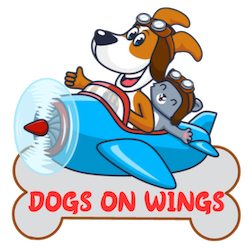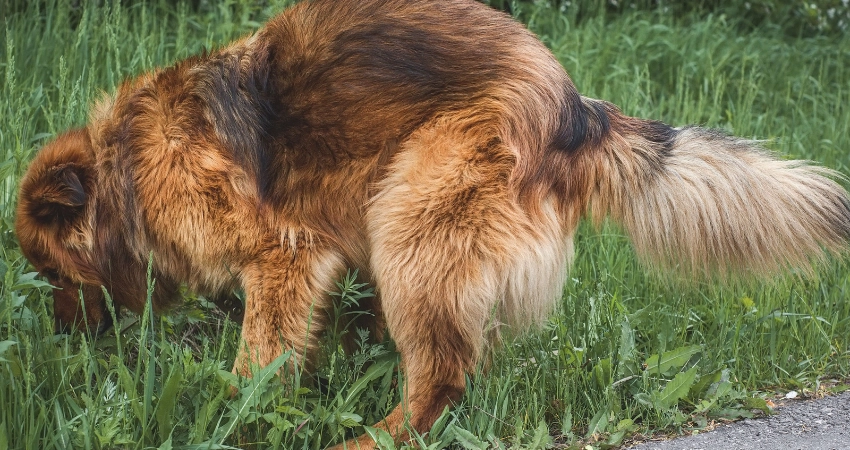Have you ever wondered why do dogs eat poop? This behavior, known as coprophagia, is more common than it seems and can intrigue even the most experienced pet owners.
Although it may seem disgusting and incomprehensible to humans, dogs can develop this habit for various reasons, ranging from behavioral issues to health problems.
Below, we explore in detail why do dogs eat poop, the risks involved, and most importantly, how you can prevent or correct this situation. Keep reading to discover effective ways to handle this behavior and ensure your four-legged friend’s well-being!
What is coprophagia?
Before understanding the possible answers to the question “why do dogs eat dog’s feces?”, it’s essential to know that coprophagia is the technical term used to describe the act of ingesting feces.
This behavior may seem revolting to humans, but in some situations, it is considered normal among dogs. For example, it’s common for females who have just given birth to consume their puppies’ feces during the first few weeks of life.
In adult dogs, however, coprophagia is usually a sign that something isn’t quite right. Whether due to health problems, nutritional imbalances, or even psychological issues, this behavior needs to be investigated to ensure the dog is healthy and happy.
Additionally, coprophagia can be divided into two main types:
- Autocoprophagia: when the dog eats its own feces;
- Allocoprophagia: when the dog consumes feces from other animals, such as cats, birds, or other dogs.
Why do dogs eat poop? Main reasons
1. Nutritional deficiencies
One of the main answers to the question “why do dogs eat poop?” is a lack of essential nutrients in their diet. When a dog’s food does not meet all their body’s needs, they may seek alternative sources of nutrients.
Feces, although seemingly useless to us, may contain partially digested food remnants that still have nutritional value. For example, dogs fed low-quality kibble or not provided with a balanced diet may develop this behavior.
Additionally, certain health conditions, such as exocrine pancreatic insufficiency, can hinder nutrient absorption, which also contributes to coprophagia.
2. Digestive problems
Issues within the digestive system are another common cause of this behavior. In cases of poor digestion or malabsorption, the dog’s body fails to extract all the nutrients from the food consumed. As a result, they may instinctively look for additional sources in feces.
Moreover, conditions like intestinal parasites can exacerbate this situation, increasing the dog’s need to find other sources of sustenance. Therefore, if your pet suddenly starts eating feces, it’s crucial to take them to the vet to rule out digestive problems.
3. Imitation and learning
Dogs, especially puppies, learn a lot by imitation. During the socialization process, they observe the behavior of other dogs or animals around them. If an adult dog or even another puppy eats feces, the puppy may attempt to mimic the behavior.
This habit may also emerge when owners clean up feces hastily or carelessly. The dog might associate the quick hand movements or the smell of feces as something interesting and start investigating out of curiosity.
4. Boredom and anxiety
A dog that spends too much time alone or without enough stimulation may develop compulsive behaviors, such as chewing objects, excessive licking, or even eating feces. Boredom and anxiety are significant triggers for problematic animal behaviors, and coprophagia might be just one symptom.
Poorly enriched environments, lack of walks, or limited interaction with the owner are factors contributing to this habit. Additionally, dogs suffering from separation anxiety may resort to coprophagia as a way to cope with stress.
5. Seeking attention
If the owner reacts excessively upon seeing the dog eating feces—shouting or rushing to stop it—the dog may interpret this reaction as a reward. After all, they managed to grab the owner’s attention, even negatively. This unintentional reinforcement can cause the behavior to persist or even worsen.
What are the risks of ingesting feces?
Now that we’ve clarified the doubt “why do dogs eat poop?”, let’s discuss the risks this type of behavior poses for the animal. Eating feces can expose dogs to various health problems, such as:
- Internal parasites: Feces can contain worm or parasite eggs, such as giardia and roundworms, which can infect the dog’s digestive system.
- Bacterial infections: Bacteria like Salmonella and E. coli are commonly found in feces and can cause serious health complications.
- Toxins: Depending on what the other animal consumed, feces may contain toxic substances, such as medications or foods dangerous for dogs.
- Digestive disorders: Frequent ingestion of feces can lead to vomiting, diarrhea, and gastrointestinal inflammation in dogs.
It’s crucial to act quickly to prevent this behavior from becoming a recurring habit.
How to prevent this behavior?
As mentioned, understanding the reasons behind “why do dogs eat poop?” is the first step to identifying the root of the problem. But how can you prevent this harmful behavior? Check out these tips:
1. Adjust the diet
One of the first steps is ensuring your dog has a high-quality diet suited to their needs. Consult a veterinarian about including vitamin supplements or adjusting the kibble. This can help address any nutritional deficiencies and reduce the need to seek nutrients elsewhere.
2. Provide regular stimulation
Dogs need physical and mental activities to stay healthy and happy. Walks, playtime, exercises, and even interactive toys help reduce boredom and anxiety. This not only minimizes coprophagia but also improves the dog’s overall well-being.
3. Invest in training
Basic commands like “no” or “leave it” are valuable tools to prevent feces consumption. Whenever the dog avoids eating feces, reward them with treats or praise. Positive reinforcement is an effective strategy for modifying undesirable behaviors.
4. Keep the environment clean
Remove feces from the yard or the area where your dog roams as quickly as possible. The less access they have, the lower the chance of consuming feces. If you also have cats, make sure the litter box is in a location inaccessible to the dog.
5. Use specific products
There are supplements on the market that make feces less appealing to dogs by altering their taste or smell. These products can be a good alternative, especially when combined with other prevention strategies.
When to seek professional help?
If the behavior persists even after dietary and environmental changes, it’s essential to seek professional help. This way, you can gather more information about the topic “why do dogs eat poop“.
A veterinarian can perform tests to rule out health issues, while a trainer or behaviorist can identify emotional or environmental factors contributing to the problem.
In severe cases, more intensive monitoring may be necessary to correct the behavior. The sooner the problem is addressed, the better it will be for the dog’s well-being.
Why do dogs eat poop? Fun facts about dog behavior
- Natural hygiene: In wild environments, dogs consume feces to hide traces of their presence and avoid predators;
- Species differences: Some dogs prefer feces from other animals, like cats, because these feces have higher protein content;
- Puppy behavior: Coprophagia is more common in puppies and often disappears naturally over time.
Understanding is the first step to action
Understanding everything related to the question “why do dogs eat poop?” is essential to address the behavior effectively and avoid frustrations for both you and your pet.
Many owners resort to immediate punishment, but this approach doesn’t solve the root of the problem and can even cause more anxiety in the animal. Remember, every dog is unique, and the reasons behind coprophagia can vary.
What works for one dog may not work for another. That’s why adopting an integrated approach, considering the dog’s health, environment, and behavior, is crucial for lasting results.
If you’ve faced or are currently dealing with this issue, know that with patience, dedication, and the right support, it’s possible to correct the behavior and ensure a happier, healthier life for your dog. After all, our companions deserve all the care and attention!
Conclusion: Why do dogs eat poop?
Understanding the answer to “why do dogs eat poop?” goes beyond solving an unpleasant habit; it’s about caring for your pet’s physical and emotional well-being.
This behavior, often motivated by nutritional deficiencies, behavioral issues, or even health problems, can be corrected with patience, routine adjustments, and, in some cases, professional help.
Whether due to boredom, curiosity, or more serious factors, each case requires a unique approach. Now that you know the causes and prevention methods, you’re better prepared to help your dog overcome this behavior and live a healthier, happier life.
Remember: love and care are the best tools to understand “why do dogs eat poop?” and help them abandon this habit. If you need support or guidance, consult a veterinarian or a canine behavior specialist.

